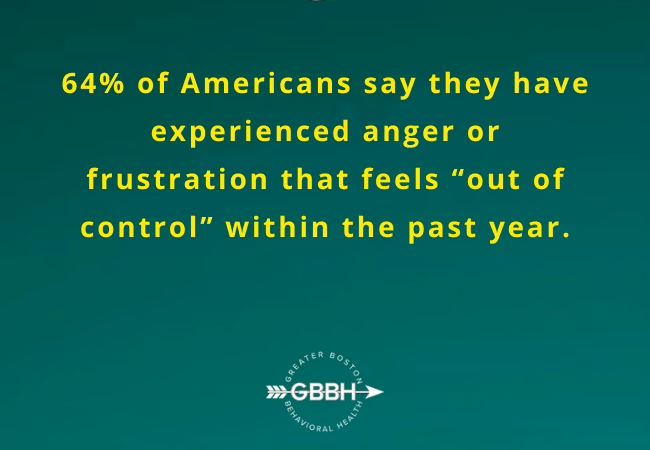Anger is a normal emotion, but when it becomes excessive, explosive, or uncontrollable, it can damage your relationships, career, and emotional well-being. If you’ve made the brave choice to begin Anger Management Therapy in Boston, you might be wondering: How long does it take for therapy to work? When will I start to feel more in control?
The answer isn’t one-size-fits-all. The time it takes to see results from anger management therapy depends on the individual, the severity of their symptoms, and the type of treatment they receive. At Greater Boston Behavioral Health, we help clients of all backgrounds develop emotional regulation skills through personalized, evidence-based Mental Health Programs in Boston—from outpatient therapy to residential treatment.
In this article, we’ll explore how long anger therapy typically takes, what progress looks like, and how you can maximize your success.
How Long Does Anger Management Therapy Take?
Most individuals begin to notice positive changes within six to eight weeks of consistent therapy. These early improvements often include increased emotional awareness, fewer angry outbursts, and better communication skills. For more lasting and sustainable changes—especially when anger is rooted in deeper issues such as trauma or anxiety—therapy typically lasts 12 to 20 weeks or longer.
Clients with complex needs or severe emotional dysregulation may require more intensive care over several months, particularly if they enroll in a Partial Hospitalization Program in Boston, Residential Treatment Program in Boston, or Intensive Outpatient Program in Boston.
General Timeline for Progress
Weeks 1–4:
- Becoming aware of triggers and emotional patterns
- Learning the basics of emotional regulation
- Identifying goals and participating in self-assessment
Weeks 5–8:
- Noticing fewer impulsive reactions
- Practicing communication and coping strategies
- Developing confidence in managing day-to-day stressors
Weeks 9–12:
- Strengthening emotional regulation across multiple settings
- Improving relationships at home, work, or school
- Experiencing longer periods of emotional stability
3–6 months and beyond:
- Mastering anger management skills
- Healing underlying emotional wounds or trauma
- Building long-term mental resilience and emotional maturity
What Influences the Length of Therapy?
Several factors influence how long it takes for anger management therapy to show results. Understanding these variables can help set realistic expectations and create a strong foundation for your healing.
1. Severity of Symptoms
The intensity and frequency of your anger episodes play a key role. Someone who has frequent outbursts, violent episodes, or legal involvement may require more intensive care over a longer period.
2. Underlying Mental Health Conditions
If anger is linked to trauma, anxiety, depression, or bipolar disorder, it may take longer to see results. That’s why at Greater Boston Behavioral Health, we provide integrated care through our Psychiatric Care in Boston team to treat co-occurring conditions alongside anger.
3. Type of Therapy and Level of Care
Clients participating in more structured programs such as PHP, IOP, or residential treatment often experience quicker and more significant breakthroughs due to the immersive nature of care. However, many clients do very well in weekly outpatient sessions when they are consistent and engaged.
4. Participation and Consistency
Those who attend sessions regularly, complete assignments, and actively practice coping strategies outside of therapy generally experience faster and more lasting results.
5. Support Systems
A strong support system can reinforce positive changes and reduce triggers. Clients with supportive family, friends, or therapy groups often feel more confident in their progress.
What Does Progress Look Like?
Anger management therapy isn’t just about learning how not to yell. It’s about building a completely different relationship with your emotions. Signs that therapy is working include:
- Pausing before reacting to frustration
- Expressing needs assertively rather than aggressively
- Apologizing and repairing conflicts more easily
- Feeling more confident in social situations
- Noticing physical changes like less muscle tension or improved sleep
Therapy also provides insight into what’s beneath the surface. Many clients discover that anger is a cover for deeper feelings—fear, sadness, shame, or loneliness. As they process these root emotions, their anger naturally begins to lose its power.
Types of Programs and How They Affect Results
At Greater Boston Behavioral Health, we offer multiple levels of care so clients can receive the exact support they need based on the severity of their symptoms and their lifestyle demands.
Outpatient Therapy
- Best for clients with mild to moderate anger issues
- One to two sessions per week with a licensed therapist
- Noticeable results typically within 8 to 12 weeks
Intensive Outpatient Program in Boston
- Ideal for clients needing structured therapy but maintaining work, school, or caregiving responsibilities
- Three to five days per week, several hours per day
- Most clients report progress within 6 to 10 weeks
Partial Hospitalization Program in Boston
- Provides full-day treatment five days a week
- Recommended for clients with severe anger issues, co-occurring disorders, or functional impairment
- Significant emotional and behavioral improvements often seen in 4 to 8 weeks
Residential Treatment Program in Boston
- 24/7 live-in care for clients who need intensive therapy and a break from daily stressors
- Best for individuals with chronic or treatment-resistant anger
- Typically lasts 30 to 90 days, followed by step-down to IOP or outpatient care
Inpatient Treatment Program in Boston
- Short-term care focused on stabilization during a crisis
- Often used for clients at risk of harming themselves or others
- Typically followed by transition into PHP, IOP, or residential care
What Therapies Are Used in Anger Management?
Our clinicians use a variety of proven methods tailored to each client’s needs:
- Cognitive Behavioral Therapy (CBT) to identify and change negative thought patterns
- Dialectical Behavior Therapy (DBT) for emotional regulation and mindfulness
- Trauma-Informed Therapy for clients with past abuse, loss, or neglect
- Interpersonal Therapy to improve communication and relational conflict
- Mindfulness Training to reduce physical arousal and increase emotional clarity
These therapies are offered within all levels of care and are delivered through individual sessions, group therapy, family counseling, and psychoeducation.
Long-Term Outcomes of Anger Therapy
While timelines may vary, the ultimate goal is to develop emotional mastery, reduce reactivity, and build healthier habits that last a lifetime. Clients who complete anger management therapy often experience:
- Healthier relationships and fewer conflicts
- A greater sense of inner calm and emotional control
- Stronger communication and problem-solving skills
- Reduced anxiety, stress, and guilt
- Better physical health, including reduced blood pressure and better sleep
Therapy doesn’t just help you control your anger—it helps you understand yourself, reconnect with others, and feel empowered to respond to life with strength instead of fear.
How Do I Know When I’m Ready to “Graduate” from Therapy?
There’s no official finish line—but most clients reach a point where they can manage challenges independently, with minimal support. Some choose to continue therapy monthly or quarterly for maintenance, while others transition into community-based support groups or alumni networks.
At Greater Boston Behavioral Health, we provide aftercare planning, outpatient follow-up, and peer support to help clients continue progressing after completing structured programs.
Why Choose Greater Boston Behavioral Health?
At Greater Boston Behavioral Health, we believe that emotional wellness is possible for everyone—even if you’ve struggled with anger, stress, or relationship challenges for years. We provide a safe and supportive space where healing doesn’t just happen—it’s guided, nurtured, and sustained.
Here’s what sets us apart:
Personalized, Evidence-Based Care
We know that no two individuals experience anger in the same way. That’s why we develop a custom treatment plan tailored to your emotional history, current challenges, and long-term goals. Whether you’re seeking weekly therapy or immersive support in our Residential Treatment Program in Boston, your path is uniquely yours—and we’re here to walk it with you.
Comprehensive Programs at Every Level
From outpatient sessions to our Intensive Outpatient Program in Boston (IOP), Partial Hospitalization Program in Boston (PHP), or Inpatient Treatment Program, we offer a full spectrum of care. This flexibility allows you to begin treatment at the level that’s right for you and move through stages of care as you grow.
Experienced and Compassionate Clinicians
Our team includes licensed therapists, psychiatrists, and mental health professionals who are not only highly trained but deeply compassionate. We specialize in trauma-informed care, anger management, mood disorders, and co-occurring conditions—providing the support you need in a space where you’ll feel understood, not judged.
Holistic and Integrative Approach
We blend proven therapeutic techniques such as CBT, DBT, and mindfulness with psychiatric care and life skills development. This allows us to treat the whole person—mind, body, and emotions—not just the symptoms of anger.
A Welcoming, Safe, and Inclusive Environment
Healing requires safety and connection. Whether you are coming to us as an individual, partner, parent, or professional, you will be welcomed with open arms and treated with respect. We are committed to diversity, inclusion, and dignity in every aspect of our care.
Conclusion
If anger has been interfering with your relationships, your work, or your peace of mind, you don’t have to keep pushing through it alone. You deserve the freedom that comes from feeling calm, in control, and connected to the people and goals that matter most.
At Greater Boston Behavioral Health, our expert team is ready to help you gain that freedom through supportive, structured, and effective Anger Management Therapy in Boston. Whether you need weekly outpatient counseling or a higher level of care, we’ll help you choose the path that fits your life—and walk alongside you every step of the way. Call us today at (888) 278-0716 to speak with our admissions team or schedule your confidential consultation. Let today be the day you take back control and start building the emotionally balanced life you deserve.
FAQ on Time Anger Management Therapy Take
How soon will I notice results from anger management therapy?
Most individuals begin to notice changes within 6–8 weeks of consistent therapy. Significant long-term results, such as better emotional control and stronger relationships, typically occur within 3–6 months, especially when therapy is combined with structured support.
Does the intensity of therapy affect how fast I improve?
Yes. Participating in more structured programs like our Partial Hospitalization Program in Boston or Intensive Outpatient Program in Boston often leads to quicker results due to the frequency and depth of therapeutic intervention.
What if my anger is related to trauma or anxiety?
If your anger stems from trauma, anxiety, or other co-occurring conditions, therapy may take longer—but will also lead to deeper healing. We offer integrated care, including Psychiatric Care in Boston, to address underlying causes.
Can I speed up my progress in therapy?
Yes. Attending all sessions, practicing skills between appointments, and engaging in reflective exercises (like journaling or mindfulness) can accelerate your results.
Do I need residential or inpatient care for anger issues?
Not always. Some people benefit from Outpatient Therapy, while others need more immersive care. Our team will help determine if a Residential Treatment Program in Boston or Inpatient Treatment Program is right for you based on your symptoms and needs.
slot qris
slot thailand
toto slot
toto macau
slot gacor 2025
totoagung
slot resmi
togel slot
bandar toto
situs toto
totoagung
agen bola sbobet
toto togel
toto macau result
toto macau 4d
idn toto
slotgacor4d
situs toto gacor
pay4d
slot gacor 777
pay4d
toto slot
idn togel
slot 4d
sbobet
togel online
slot gampang menang
slot terpercaya
toto macau terbesar
toto macau terbesar
toto slot
data macau
slotgacor4d
slot gacor maxwin
slot qris
slot gacor
slot gacor 4d
pay4d group


